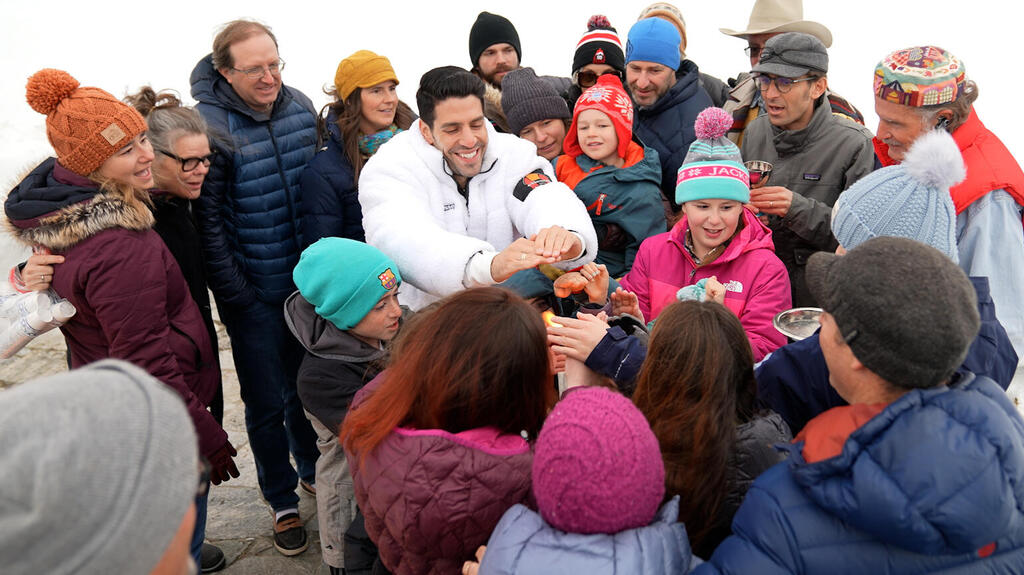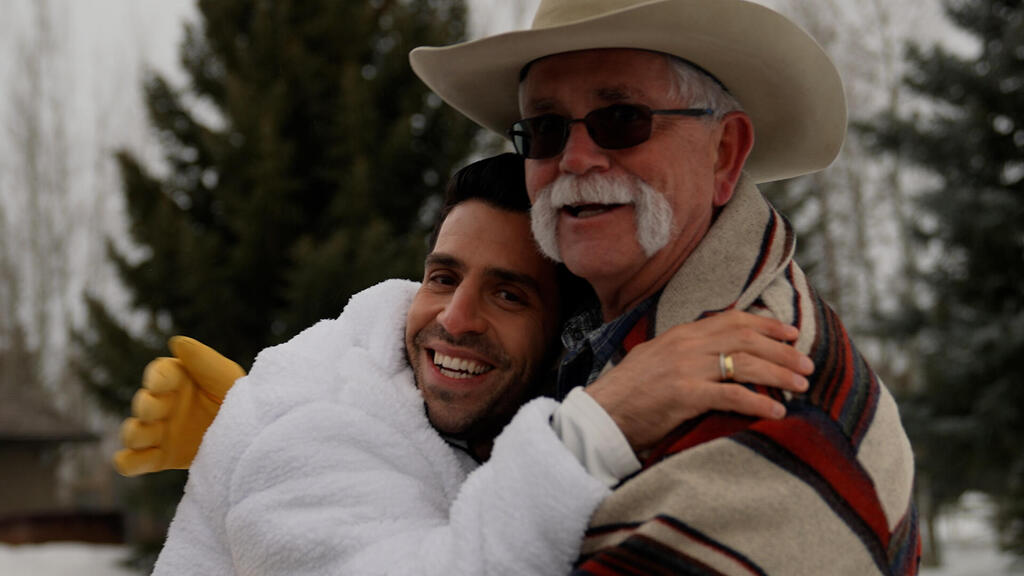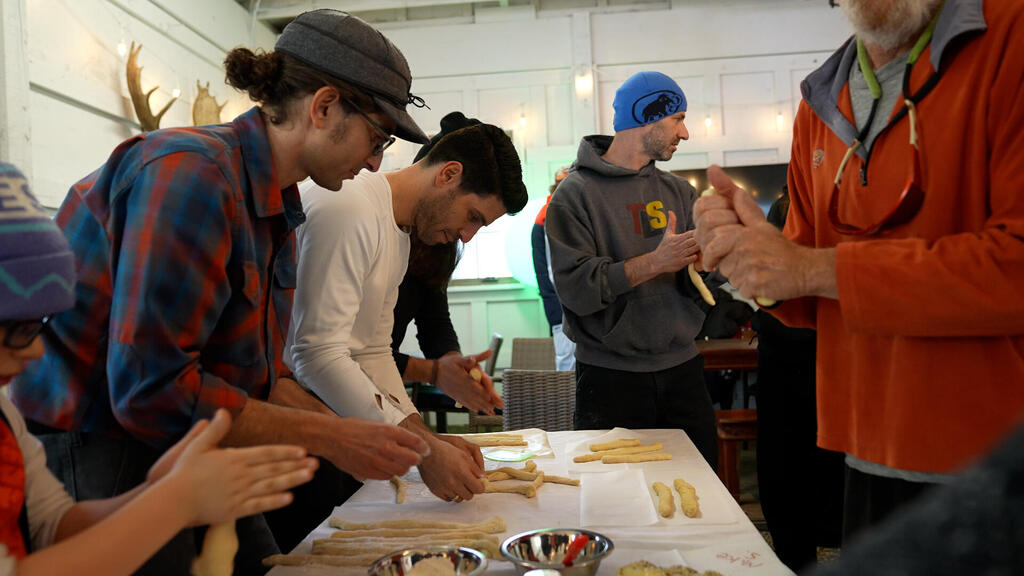Getting your Trinity Audio player ready...
Wyoming, located in the Mountain West sub-region of the Western United States, is a state with the smallest population, totaling "only" 580,000 people. There are even fewer Jews, only 1,150, making up only 0.01% of all Jewish people in the country.
This snowy state – a gem for those on the lookout for breathtaking nature reserves – was visited by Israeli actor and comedian Ori Laizerouvich in an attempt to understand how the local Jewish community manages to maintain its culture, expressed often through cuisine.
This was the last stop on the Ruderman Family Foundation's adventure filming its new original series "Jewish Foodie," Laizerouvich. In the episode, the Israeli comedian embarked on a journey to explore American Jewish communities through food.
"I started this journey with a certain idea about American Jewry – best known from big cities like New York or Los Angeles," Laizerouvich said, "but along the way, I discovered different tastes and a Judaism far beyond what I thought.
"In the end, thanks to the traditional and as well as new types of food, I felt very much at home. So yeah, we are different from one another, Israelis and Americans, but we also have a common past and the ability to create a shared future because in the end -we are one people."
The Jewish Foodie - Episode 9: Wyoming
(Ruderman Family Foundation)
Most of Wyoming's Jews live in the cities of Cheyenne and Jackson Hole, with 500 and 300 Jews in each, respectively. The whole state of Wyoming consists of only five synagogues - only one of which is Orthodox - and one Chabbad center.
For over 40 years, the Jewish community in Jackson Hole operated an independent synagogue, which does not fall under any specific branch of Judaism, calling itself the Jackson Hole Jewish Community (JHJC). It acts as a community center, including a place for worship, Jewish education institute for all ages, and summer camp. During the year, the JHJC hosts many events there, such as a Hannukah parties, a wide array of lectures, and "Shabbat Swinging" dance nights.
In 1975, Lori Taal came to Jackson Hole Wyoming, where she met Larry – and ended up extending what she though would be a ski vacation. She said that they've always felt surrounded by a wonderful community, but when they brought kids into this world, Larry insisted their community become even more embracing. Therefore, the couple established a warm and growing community, which received great support from the locals, many of whom non-Jews.
Take, per se, Oscar Ortega - a non-Jew chocolatier from Jackson Hole. He voluntarily makes Hanukah gelt with the engravement of the community symbol for the holidays.
The Jews in Wyoming get to enjoy one of the state's staple foods - the bison burger. The bison provides Kosher meat, and is state's symbol, appearing on its flag.
Mary Grossman, who has been the CEO of the community for the past 11 years, says the community members pay a $655 annual membership fee.
Among the ceremonies and events they host, there is also a "HavdaChallah" ceremony - a fusion between Havdalah and challah baking. At the end of this ceremony, each community member brings a dish unique to his or her family.
"In Israel, everything is taken for granted," Laizerouvich said. "You do Kiddush because that's everyone does. Here, the energy is different. Mesmerizing. After all the food that we ate in New York, in Memphis, in Texas - you come here, to this place, and the little kids who bake you these small challah breads - it is the taste of home."
Jewish Foodie - Episode 10: "HavdaChallah" ceremony in Wyoming
(Ruderman Family Foundation)
The first Jewish person to settle in Wyoming was likely Joseph Han, who arrived in 1862 during the California Gold Rush. The story of the state's Jews is closely linked to the story of American independence, with the development of the Union Pacific Railroad. As part of the Western U.S. networking, the railroads reached southeastern Wyoming in 1867 and helped attract merchants, including German Jewish immigrants seeking economic opportunities, freedom of religion, and the possibility of integrating into society.
The merchants arrived in Cheyenne and Laramie, where they sold clothes, drinks, and cigars. Among those German Jewish merchants who settled in the city of Cheyenne was Max Meyers - who opened a small convenience store. Meyers and the Jews who came after him were welcomed by the pioneers who founded the state, who saw them as completely equal residents.
When Wyoming officially became a state in 1890, hundreds of Jewish European immigrants began to arrive. By 1897, the number of Jews in Wyoming stood at 1,000. Many of the immigrants preferred Wyoming's large open spaces over the overcrowding in the cities of the east coast. In order to meet the needs of the growing Jewish community, the Mt. Sinai Congregation was established in Cheyenne in 1915.
Various reforms, offering land plots and agricultural business opportunities drew the Jewish immigrants to the region. Wyoming, being relatively free of antisemitism, became more and more attractive for Jews in the early 20th century.
In the years 1930-1950, the community flourished and integrated into the general society, succeeding in business, and its members even occupied a variety of public posts. However, in 1950 a large amount of the population left the state and moved to bigger cities to get access to better education and employment opportunities.
Despite being the smallest state, Wyoming's Jewish community is seeing a steady growth in population. In 1980, only about 310 Jews lived in the state. By 2022, the community has grown by 370%. The Jews mostly come from large urban areas to improve their quality of life and connect with the spectacular landscapes the state has to offer.







